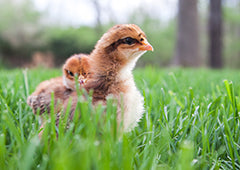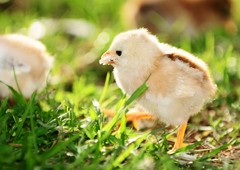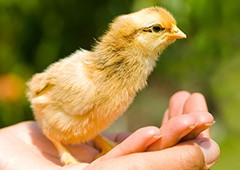Raising Baby Chickens - What To Do In The First 24 Hours
So the magical hatching day has arrived! You have watched in awe of how these fluffy little beings hatched from mere tiny eggs you put in the incubator, or under your hen a matter of days ago! But now the little ones are almost out, and you begin to panic - what on earth are you meant to do now?

Keep calm - the baby chickens are probably exhausted!
Many people fret over the poor little babies - hatching is very eggs-hausting business, and sometimes the little chicks are just plain old wrecked after a hard days hatch! So if you notice your baby chickens slumped over and panting, and just looking a little listless, don’t panic - they’re probably just wrecked from the hard hatching process.
They’ll also be looking pretty damp, and you might be tempted to try and dry them. Don’t worry about it - they’ll fluff up on their own within a few hours. It’s important that the baby chicks are not moved from their mother or the incubator until they have fully fluffed up, otherwise they might catch a chill!
Encourage them to drink some water
When baby chickens hatch, they actually eat the yolk and the membrane of their eggshell, which provides them with lots of very valuable nutrients! Because the baby chickens have already eaten their shell nutrients, they don’t really need to feed again until 1-2 days after they hatch.
However, it’s very important that the baby chickens have some water within the first 24 hours of their life. Because they’re mere hours old, the baby chickens might not know how to actually drink! If they’ve been hatched naturally, the mother hen should teach her little babies how to drink from the fresh water, so make sure there’s some nearby.
If the chickens have been hatched with an incubator, then you should pop a baby chicken waterer into the incubator. If within a few hours they haven’t cottoned on to drinking, you might need to encourage them by gently dipping their beak into the water. It’s important that the water is in a specially designed baby chicken waterer, as an adult-sized waterer can spell disaster for your precious baby chickens (they can fall in). Be careful to handle them well, as they’ll probably become distressed - but it’s very important that they drink! If they don’t get it at first, just be persistent and patient - but always gentle.

Don’t take them out until you’re sure all the baby chickens have hatched
When it comes to hatching, you might notice some hatching around the same time. After a couple of hours, it might be tempting to take the baby chickens out of the incubator and put them into the brooder. Surely the hatching is all done, right? Wrong! There’s no real way of predicting when the chickens are going to hatch - you might think it’s all done, when suddenly 10 hours later another one pops out of the shell! That’s why it’s important to keep your baby chickens in the incubator for 24-48 hours, as their cheaping actually encourages any other baby chickens in the shell to hatch out! Even after you take the baby chickens out after 24-48 hours, leave the other fertilised eggs in the incubator for just one more day, just to be sure.
Hatching day can be very exciting, usually followed by waves of ‘what do I do now’s?’ Be informed, but don’t stress - that way, your baby chickens will be on their path to healthy adulthood in no time at all.
We all know just how quickly these little ones grow up so you are going to want to make sure that you've got the knowledge you need to raise a happy, healthy flock. You wouldn't want to risk making tragic mistakes that could affect their development, growth or worse!
67% of chicken keepers surveyed experienced a chicken health or behaviour issue in the first 12 months that they didn’t know how to handle. This is why I highly recommend that you check out our friends at Chickenpedia. Their Raising Baby Chicks course provides lots of valuable information to help you avoid any life-threatening accident. You'll have all the confidence to give your feathered friends the best start in life.
Of course, the best way to prepare them for adulthood is to find the perfect coop for them to live in once they outgrow the brooder! Our Taj Mahal, Penthouse and Mansion are the perfect homes for your feathered friends, and will keep them big and strong once they grow (quickly!) into full-sized chickens in about 6 weeks time.

















